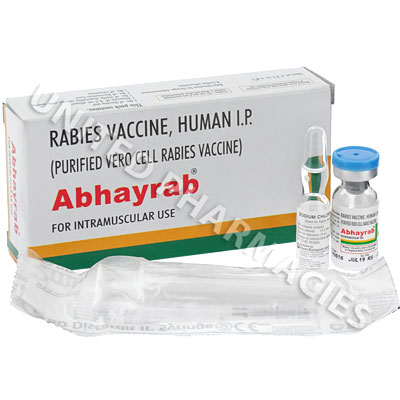Customers also like
Description
Abhayrab (Rabies Vaccine) - 1 Vial is a rabies vaccine, which is used to protect people from the rabies virus. Rabies is a lethal disease for humans, resistant to treatment. Only a timely rabies vaccine can prevent death.
Rabies is caused by a virus in the genus Lyssavirus in the family Rhabdoviridae. The major carriers of the disease are wild animals and bats. The infection is transmitted through saliva with a bite of an infected animal. After the bite, the virus gets into the blood and later on spreads through the nerve pathways, reaches the spinal cord cells and cerebral cortex, causing encephalitis. Death occurs 7-10 days after the onset of the first symptoms. The reason of the death is the respiratory center paralysis. The incubation period lasts from 10 days up to 3-7 weeks.
Inactivated rabies vaccines are administered as a single dose of 1.0 ml. It contains at least 2.5 IU/ml of the rabies virus antigen (which is a standard WHO dose) and is administered in the same dose to adults and children. The cases of side effects and lack of efficacy have been registered. The vaccine injection is relatively painless.
Primary prevention
For the prevention purposes, to develop durable immunity 1.0 ml of inactivated rabies vaccine is administered three times - the second dose is prescribed in 7 days after the first injection, while the third one is prescribed in 21 or 28 days after the first one.
Secondary prevention
After the bite of an unvaccinated person by any animal has been identified, it is necessary to identify if the animal is infected with the rabies virus or not. If there are contraction risks, a person receives rabies immunoglobulin and five rabies vaccines within 28 days. Ideally, the treatment has to be started within two days after the bite.
A 1.0 ml dose of the inactivated rabies vaccine is administered on days 3, 7, 14, and 28 after the first injection. If it has been established that the animal is not infected, the vaccines can be discontinued.
Vaccination
People exposed to high rabies virus infection risks receive a 1.0 ml dose of the vaccine on the first day, while the second dose is administered in three days. Rabies immunoglobulin is not prescribed as it slows down the production of specific rabies virus antibodies.
It has been proved that most of the current vaccines either don`t have any adverse effects or such effects are extremely rare. The most common side effects of the rabies vaccine are related to the intolerance of its components by some patients.
Rabies vaccine injection side effects:
- Tenderness, redness, swelling, itching, or pain at the injection site (occurs in 30-74% of all vaccinated patients);
- Headache, nausea, stomach pain, muscle pain and dizziness (occurs in 5-40% of all vaccinated patients).
More severe complications may include:
- Hives, joint pain, fever (which occurs in about 6% of cases);
- Guillain-Barré syndrome occurs extremely rarely and would be commonly manifested by such symptoms as flaccid paresis, sensation disorders, autonomic disturbances, which all subside completely within 12 weeks.
In all doubtful cases, it is recommended to consult your doctor.
In case any serious side effects occur, please make sure to comply with the following steps:
- Immediately consult your doctor.
- Note down the date, time and type of the complication.
A health care facility or a local health care center have to prepare paperwork regarding the case and submit it to the Vaccination Center.
Before medical procedures, any contraindications to the vaccination have to be identified. Caution should be exercised when vaccinating children with the following conditions:
- Immunodeficiency disorders, associated with HIV/AIDS;
- Tumors;
- Side effects, associated with previous vaccination.






